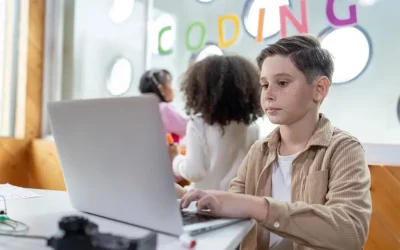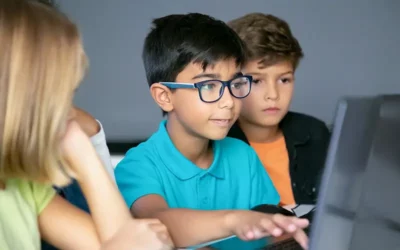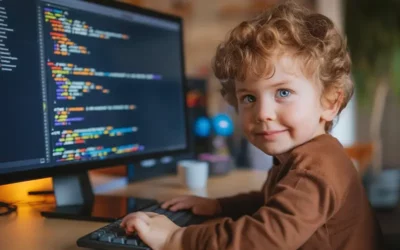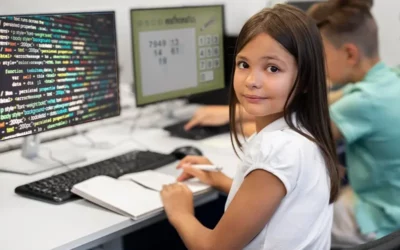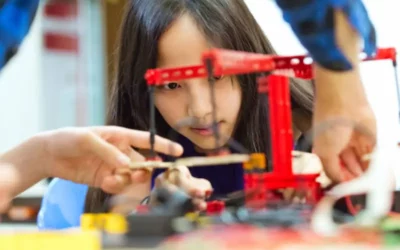Welcome to “9 Free Coding Websites for Kids: A Parent’s Guide,” where we explore a world of digital learning opportunities tailored specifically for young minds. In today’s rapidly evolving technological landscape, coding skills have become increasingly essential for future success.
As a parent, you want to provide your child with the tools and resources they need to thrive in this digital age. That’s why we have curated a comprehensive list of nine exceptional coding for kids websites that offer free access to engaging and interactive programming lessons designed specifically for kids.
Whether your child is a budding programmer or simply curious about the world of coding, these websites provide a fantastic starting point to cultivate their interest, enhance problem-solving abilities, and ignite their creativity.
Join us on this enlightening journey, as we discover the best free coding for kids websites to empower your child to become the tech leaders of tomorrow.
Table of contents
Introduction
In today’s digital age, computer programming for kids and coding have become essential skills for success in various fields. As technology continues to advance and permeate every aspect of our lives, it is crucial to equip our children with the ability to understand and create with code.
Learning to code at an early age not only opens numerous opportunities for their future but also fosters valuable skills that extend beyond the realm of technology.
In this blog, we will explore the importance of teaching kids how to code and the benefits it can bring.
1. Enhances Logical and Problem-Solving Thinking
Learning to code teaches kids to think critically and approach issues analytically. Coding teaches students how to divide challenging tasks into smaller, more manageable pieces, enabling them to approach problems methodically.
Because coding calls for logical reasoning, sequencing, and debugging, it fosters the development of problem-solving abilities that are useful in a variety of contexts, such as academia, decision-making, and everyday life.
2. Encourages Creativity and Imagination
Contrary to popular opinion, coding involves more than just adhering to rigid rules and specifications. It provides a platform for innovation and creative expression. When kids learn to code, they may make their own games, animations, tales, and interactive projects to bring their ideas to life.
Coding gives students the freedom to use their imaginations, try out new ideas, and think creatively. It motivates individuals to use technology as creators rather than merely as consumers.
3. Prepares for the Future Job Market
Technology is transforming the world rapidly, and coding skills are increasingly in demand across various industries. By introducing children to coding early on, we provide them with a competitive edge for future career opportunities.
Regardless of whether they pursue a career in technology, coding skills complement a wide range of professions. Understanding the fundamental concepts of coding equips kids with a digital literacy that can be applied in fields such as science, engineering, design, finance, and even arts.
4. Cultivates Persistence and Resilience
Coding is an iterative process that often involves trial and error. It teaches children the importance of persistence, patience, and the ability to learn from mistakes. It instills in kids the value of tenacity, patience, and the capacity to learn from mistakes.
When confronted with a bug or a coding challenge, kids learn to endure, try out various strategies, and come up with original solutions. They can apply the resilience they develop via coding to other aspects of their lives, developing a growth mindset and the conviction that they can overcome challenges with grit and perseverance.
5. Encourages Communication and Collaboration
In the world of coding, cooperation is essential. A lot of coding projects are created in teams, where people with various expertise collaborate to realize ideas. Children gain valuable communication, sharing, and teamwork skills by participating in coding activities.
They improve their ability to work with others and in teams, comprehend the significance of group problem-solving, and value other viewpoints—skills that are essential for the workplace of the future and beyond.

Top 9 free websites for coding
1. Codecademy
A well-liked website for newbies, Codecademy provides interactive coding classes in many different programming games for kids & languages, including Python, JavaScript, HTML, CSS, and more. To help you remember what you’ve learned, they offer practical coding tasks and activities.
There are free and premium plans available from Codecademy, with the free plan giving access to fundamental coding classes.
2. Coursera
Coursera is renowned for its wide selection of online courses, which includes coding. Several coding classes for kids & all on Coursera are still accessible for free, despite the fact that the majority of the courses there have a cost.
Reputable universities and organizations provide courses on subjects including web development, data science, and the fundamentals of computer science.
3. EdX
EdX is a website that provides free online courses from prestigious institutions. Python, Java, and C++ are just a few of the programming languages they offer training in. edX offers self-paced learning choices that enable you to learn at your own pace and awards certifications once you’ve finished.
4. Khan Academy
A non-profit educational platform, Khan Academy provides lessons in a variety of areas, including coding. Their JavaScript-focused coding games for kids & program offers interactive activities and projects to aid in the development of your coding abilities. Beginners should take coding courses from Khan Academy.
5. FreeCodeCamp
FreeCodeCamp is a community-driven platform that provides a thorough web programming education. HTML, CSS, JavaScript, and other pertinent technologies are covered in their courses. FreeCodeCamp promotes practical code projects that can be included in your coding portfolio in addition to the course material.
6. MIT OpenCourseWare
OpenCourseWare from MIT The course materials from MIT, particularly those pertaining to coding, are accessible for free through OpenCourseWare. While you won’t obtain official MIT credit, you can browse their extensive library of coding lectures, assignments, and courses to learn from one of the top universities in the world.
7. Udacity
Udacity provides both free and cost-effective coding classes. They provide a variety of free courses in subjects like web development, data science, and AI. The courses offered by Udacity were developed in association with experts in the field and incorporated practical assignments to improve learning.
8. GitHub Learning Lab
GitHub Learning Lab is a distinctive platform that emphasizes learning to code through hands-on projects and authentic situations. They provide tutorials on utilizing Git and GitHub for version management as well as interactive coding exercises. For people who are interested in cooperating and making contributions to open-source projects, GitHub Learning Lab is a great resource.
9. BrightCHAMPS
CodeChamps by BrightChamps is an extraordinary platform that ignites young minds with the power of coding. It is a creative wonderland where kids dive into the captivating world of programming, learning to unravel complex algorithms and craft their own digital masterpieces.
With a holistic curriculum, CodeChamps nurtures the innate problem-solving abilities of children, fostering their creativity and critical thinking. CodeChamps is where dreams come alive, and the future of innovation takes flight with coding classes for 3 year olds.

Conclusion
In conclusion, online coding websites offer numerous benefits for kids interested in programming and computer science. These platforms provide a dynamic and interactive learning environment that promotes creativity, critical thinking, and problem-solving skills. The benefits of online coding websites for kids are multifold.
1. First, these platforms offer a wide range of kids coding languages and tools specifically designed for young learners. They provide structured courses and tutorials that guide children through the fundamentals of coding, gradually building their knowledge and proficiency. This systematic approach ensures that kids can learn at their own pace and progress smoothly through the learning materials.
2. Second, online coding websites foster a sense of independence and self-directed learning. Children can explore coding concepts and practice their skills independently, without the need for constant supervision. They have the freedom to experiment, make mistakes, and learn from them, promoting a growth mindset and resilience in the face of challenges.
3. Third, online coding websites often incorporate gamification elements into their learning programs. By turning coding exercises and projects into engaging games, these platforms make the learning process enjoyable and immersive for children. Gamified experiences enhance motivation and engagement, encouraging kids to persist in their coding journey and unlock new achievements.
4. Fourth, online coding websites provide a supportive community for young learners. These platforms often include forums, chat rooms, and online communities where kids can connect with peers who share similar interests. This sense of belonging enables children to collaborate, share ideas, and seek help when encountering difficulties. It fosters a sense of camaraderie and encourages teamwork, essential skills in the digital era.
5. Fifth, online coding websites offer practicality and accessibility. Kids can access the learning materials from anywhere with an internet connection, making it convenient for both structured learning and independent exploration. This accessibility removes geographical barriers and enables children from diverse backgrounds to access quality coding education.
6. Sixth, online coding websites can act as stepping stone for future career opportunities. By gaining early exposure to coding and computer science concepts, children develop valuable skills that are increasingly in demand in today’s job market. Online coding platforms lay a solid foundation for kids interested in pursuing STEM-related careers, giving them a head start in their educational and professional journeys.
In conclusion, the benefits of online coding websites for kids are extensive. From promoting creativity and critical thinking to fostering independence and collaboration, these platforms offer an engaging and effective way for children to learn coding. By harnessing the power of technology, online coding websites empower the next generation with the skills and knowledge needed to thrive in the digital age.
To get your hands on more such educational and free resources on coding, robotics, game development, etc., do check out the BrightCHAMPS Blog Page now!’
Frequently Asked Questions
Ans 1. Some popular free coding websites for kids include Code.org, Scratch, and Khan Academy.
Ans 2. Consider your child’s age, experience, and interests. Look for coding websites that offer beginner-friendly courses and gradually progress to more advanced concepts.
Ans 3. Yes, many coding websites for kids such as CodeCombat and Bitsbox, use gamification to make learning programming more engaging and fun.
Ans 4. Absolutely! Coding websites encourage problem-solving and critical thinking by teaching logical reasoning, algorithmic thinking, and troubleshooting techniques.
Ans 5. Free coding websites often teach languages like Scratch (a visual programming language), Python, JavaScript, and HTML/CSS.
Ans 6. Consistency matters more than the specific time spent. Encourage your child to spend at least a few hours a week, but progress varies depending on the child’s dedication and effort.
Ans 7. Yes, reputable coding websites for kids prioritize safety and provide a secure learning environment with appropriate content and supervision.
Ans 8. Many free coding websites offer tutorials, interactive challenges, coding projects, forums, and additional resources like videos or eBooks to enhance learning.
Ans 9. Coding websites often provide progress-tracking features, such as dashboards or profiles, where parents can monitor their child’s completed lessons, projects, or achievements.
Ans 10. Many kids have gained coding skills through free coding websites and used them to create games, apps, and websites. Some have even won coding competitions or pursued further studies and careers in programming.


 We are an army of educators and passionate learners from BrightChamps family, committed to providing free learning resources to kids, parents & students.
We are an army of educators and passionate learners from BrightChamps family, committed to providing free learning resources to kids, parents & students.








